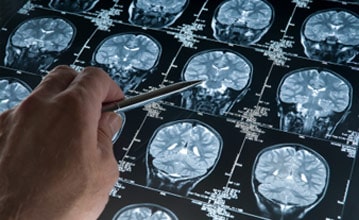Treatment for Huntington's Disease in Leesburg
Huntington’s disease is a genetic disorder that, when inherited, causes the progressive breakdown of nerve cells within the brain.
Over time, this disease causes an individual’s physical and mental health to decline drastically. There is no known cure for Huntington’s disease, though there are several treatment options available for those looking for relief from their symptoms.
Dr. Seth Tuwiner provides comprehensive testing and treatment for Huntington's disease at his offices in Leesburg, VA. Learn more about your treatment options and call the Virginia Center for Neuroscience today at (703) 293-5244.
Who is at Risk of Huntington’s Disease?
Because Huntington’s is passed on through genetics, many are curious to know their risk of passing on Huntington’s disease or inheriting it themselves. Unfortunately, this particular disease is incredibly hard to predict as it has a 50% chance of being inherited by the offspring of an affected parent.
In an effort to prevent the spread of Huntington’s Disease, many couples looking to have children opt for in vitro fertilization. During this process, eggs are extracted from the ovaries and then fertilized in a lab. The eggs are then tested for the Huntington gene, and those without the gene are implanted back into the woman’s uterus.
Such options are best discussed with a genetic counselor of your choice. This counselor will be able to provide you with plenty of information about the risks associated with Huntington’s disease and your chances of passing it on to your children.
Symptoms of Huntington's Disease
Those with Huntington’s disease usually begin to notice its symptoms between 30-40 years of age, although the disease is absolutely capable of presenting itself earlier or later in life for specific patients.
The symptoms of Huntington’s disease are widespread and can be difficult to quickly diagnose, but they will usually cause impaired movement, cognitive abilities, or behavior such as:
- Involuntary Movements
- Difficulty with speech or swallowing
- Muscle Contractions
- Impaired balance, posture, and gait
- Lack of awareness of one's own actions
- Slow thought processing
- Struggles to learn new information
- Reduced impulse control
- Insomnia
- Isolation from others
- Feelings of sadness or irritability
- Fatigue
- Frequent thoughts of death or suicide
If Huntington’s is present in adolescence or early adulthood, it is called juvenile Huntington’s disease. Cases of this disease are similar to others of Huntington’s, but may present slightly different symptoms like:
- Loss of previously learned academic material or physical skills
- Rapid decline in school performance
- Muscle contractions that severely affect the individual's gait
- Seizures, tremors, or other involuntary movements
- Subtle changes in motor skills such as a difference in handwriting
Talking to your Neurologist
As previously stated, there is no known cure for Huntington’s disease, but there are many ways in which patients can treat their symptoms of Huntington’s. It is important to discuss all of your options with your doctor to ensure that you are enjoying the highest quality of life possible while living with Huntington’s disease.
Schedule an Appointment in Leesburg, VA Today
To speak with neurologist, Seth Tuwiner about your concerns regarding Huntington’s disease, please schedule an appointment today by calling (703) 293-5244. Dr. Tuwiner has offices in Leesburg, Virginia.




